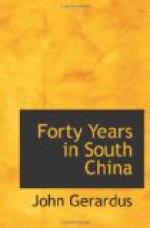“But when we come to the matter now at issue, I pause. Much as I love our brother, I love Christ more. Nor can I surrender, out of deference to our missionaries, the constitution, the policy, the interests of our Church,—all of which are involved in this matter. Nay, even their own welfare, and that of the mission they are so tenderly attached to, demand that we should deny their request. What is this request? That we should allow our brethren at Amoy, together with the English Presbyterian missionaries there, to form with the native pastors and the delegates from the native churches, an independent Classis or Presbytery, over whose proceedings this body should have no control whatever, by way of appeal, or review, or in any other form. Now, the first objection to this is, that it is flatly in the face of our constitution and order. A ’self-regulating Classis’ is a thing which has never been heard of in the Dutch Church since that Church had a beginning. It is against every law, principle, canon, example, and precedent in our books. Perhaps the most marked feature of our polity is the subordination of all parts of our body, large or small, to the review and control of the whole as expressed in the decisions of its highest ecclesiastical assembly. I submit that this Synod has no right to form or to authorize any such self regulating ecclesiastical body, or to consent that any ministers of our Church should hold seats in such a body. If we do it, we transcend the most liberal construction which has ever been known to be given to the powers of General Synod. How, then, can we do this thing? Whatever our sympathies, how can we violate our own order, our fundamental principles, the polity to which we are bound by our profession, by our subscription, by every tie which can bind religious and honorable men?
“Moreover, the thing we are asked to do contravenes our missionary policy from the beginning. As far back as 1832, when we made a compact with the American Board, one essential feature of the plan was that we should have ‘an ecclesiastical organization’ of our own. Without this feature that plan would never have been adopted; and the apprehension that there might be some interference with this cherished principle was at least one of the reasons why the plan, after working successfully for a quarter of a century, was at length abrogated. And so when, in 1857, we instituted a missionary board of our own, this view was distinctly announced.
“It was my privilege to draw up the report on the subject which has been so often referred to. That report did not express merely my view, or that of the committee, but the view of the entire Synod. Nor from that day to this has there been heard anywhere within our bounds even a whisper of objection from minister, elder, or layman in regard to the positions then taken. It is our settled, irreversible policy. Deep down in the heart of the Church lies the conviction that our missionaries, who carry to the heathen the




